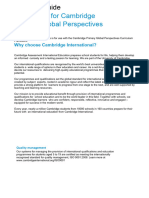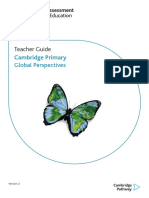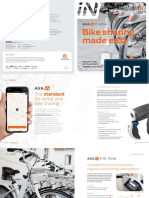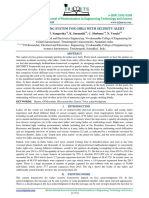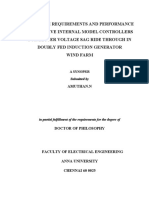Chapter 7 Developing
Uploaded by
baasankhuuChapter 7 Developing
Uploaded by
baasankhuuChapter 7: Developing the Cambridge learner attributes through
Cambridge Global Perspectives and Enterprise
Students learn to appreciate alternative perspectives on global issues where ideas and
interests compete and there are no easy answers. They learn how to evaluate
It is widely recognised that we live in an increasingly arguments, in particular the evidence and reasoning used to support them, as well as
digitised and interconnected world. The means by which we access improve the quality of their own arguments.
information and the pace with which this takes place are profoundly
changing the way we learn, communicate and work. Increasingly,
young people are faced with access to a multiplicity of competing
ideas. In such an information-rich society, young people need the
skills and dispositions to be able to think critically..
Extract from Cambridge International A Level Global Perspectives syllabus
2017–19
Overview
This guide has argued throughout that the learner attributes need to be at the heart of
approaches to teaching and learning in all disciplines and activities the school provides.
This chapter focuses on two programmes that Cambridge offers that complement a
discipline-focused curriculum. They are specifically designed to support habits and skills
development associated with preparing students for the modern global information age
and the world of work.
Cambridge Global Perspectives
Cambridge Global Perspectives is an interdisciplinary programme, currently offered
through Cambridge IGCSE , Cambridge International AS & A Level and Cambridge
Pre-U syllabuses. It focuses on the nature of argument and evidence, develops research
and information literacy skills and encourages understanding and respect for the
perspectives of others. Global Perspectives will become available for Primary and Lower
Secondary (5–14 year olds) for first teaching from June 2018.
106 Developing the Cambridge learner attributes
Chapter 7 continued
Through studying a variety of authentic and significant case studies students become Watch a higher education perspective on Global Perspectives at Cambridge
better informed about the world and better able to make informed and sensitive International A Level and Cambridge Pre-U by Stuart Schmill, the Dean of Admissions
judgements. The course develops the skills of flexible, reflective, creative and critical at the Massachusetts Institute of Technology in the US at:
thinking, and students learn how to research issues and arrive at well-reasoned and www.youtube.com/watch?v=CPxRtu7Ed_M&index=53&list=PLi4xGU_
evidenced conclusions. They also learn to work collaboratively with others and d7k_J-9Oi8Z56q7wNf_RXDGBwP
effectively communicate and critique ideas so that they become, in support of the
Cambridge learner profile, more confident, responsible, reflective, innovative and
engaged.
Case study 17:
Specifically Cambridge Global Perspectives aims to develop learners who: Cambridge Global Perspectives at Suffern School,
• understand the nature of evidence in a variety of forms and effectively evaluate New York, USA
evidence in deciding what conclusions can be reasonably reached
Two students and two teachers from Suffern High School, New York, reflect on
• can support their own arguments with sound reasoning and the appropriate use of how they find Cambridge Global Perspectives valuable in the videos below:
evidence
Hannah Conciglio - the importance of lifelong learning; Global Perspectives for
• enquire into and reflect on issues both independently and in collaboration with
international perspectives
others from a variety of cultures, communities and countries
• generate and express clearly in written and spoken forms their own well-reasoned Watch the video at https://vimeo.com/232474032
arguments
Alex Fernandez - skills gained from Global Perspectives
• use disciplined and scholarly research skills to investigate issues of global
significance Watch the video at https://vimeo.com/232473739
• consider issues from personal, local, national and global perspectives, and analyse
Jarrod Gelb - collaboration peer review
the links between them
• communicate sensitively with people from a variety of backgrounds, empathising Watch the video at https://vimeo.com/232474113
with the needs and rights of others
Bob Wilson - the importance of challenging students
• can transfer their thinking and planning skills to unfamiliar contexts
Watch the video at https://vimeo.com/232473942
• develop a sense of their own responsibility as active citizens.
For a video introduction to Cambridge Global Perspectives, go to
www.cambridgeinternational.org/globalperspectives
107 Developing the Cambridge learner attributes
Chapter 7 continued
How critical thinking, information literacy, reflection and research The Cambridge IGCSE requires students to collaborate in groups to agree an aim and
are supported and assessed through Cambridge Global then to plan, research and produce a shared outcome. Students are assessed
collectively on how well they collaborate and how well their outcome communicates
Perspectives
their research. They are also assessed individually on a reflective paper they produce
The Cambridge Global Perspectives curriculum continuum is based on a developmental which analyses and evaluates the project and reflects upon the process of collaboration
spiral of learning. At all stages, students are required to critically engage with and their own contribution to the project. The video available at www.youtube.com/
information and source material to improve their information literacy (in watch?v=YB7qD-w4vVw demonstrates one example of a collaborative project
developmentally appropriate ways reflected in course standards, activities and completed by a group of Cambridge IGCSE students at the Singapore International
requirements). At all levels students are required to complete research and to School in Hong Kong.
communicate their ideas both in writing and through spoken presentations.
Figure 8 gives an overview of the critical path methodology that forms the core of the
Schools have the opportunity to make Cambridge Global Perspectives a core Cambridge International AS Level, A Level and Pre-U programmes. Standards and
curriculum activity so that learning that takes place across the curriculum in other expectations at this stage are high, reflecting the qualification standard, but the general
subjects is linked to Global Perspectives themes. This reinforces students’ ability to
make connections between all the disciplines they are learning, reinforces learning and
helps students transfer skills and understandings from one context to the next. Figure 8: The critical path in Cambridge Global Perspectives
Alternatively schools can choose to teach Global Perspectives as a discrete subject.
A web-based learning platform is available for all schools who register for the Deconstruction
programme. This Online Learning Area has extensive materials specifically for Global
Perspectives and is freely available to all Cambridge centres delivering or considering
delivering Global Perspectives. The Online Learning Area provides online structured
courses, with guidance for both students and teachers, and multimedia resources,
together with teaching and learning activities. Secure personal journals encourage Reconstruction
higher level thinking among students as they engage with and reflect on the materials
and activities. Spaces with forum discussions allow for collaboration between schools,
in topic-based groups and within students’ own class groups. Teachers and learners can
also collaborate with other Global Perspectives teachers elsewhere in the world.
Reflection
Students can use ePortfolio tools to gather together and share their research, and gain
feedback from peers and teachers.
Teachers and students can access the Online Learning Area using any connected device,
including tablets, laptops and desktop machines. We suggest that teachers request
student accounts, thereby providing students with access outside the traditional Communication and Collaboration
classroom environment.
108 Developing the Cambridge learner attributes
Chapter 7 continued
approach is the same at lower levels so that this represents a natural progression.
Clearly developing the habits, skills and understanding needed to perform the critical Case study 18:
path well provides an excellent preparation for students engaging with ideas in other Linking the World’s Largest Lesson with Cambridge Global
subjects and preparing them for higher education and the workplace.
Perspectives at the Southland Girls’ School, Invercargill,
The learner attribute of reflection is at the heart of the programme. Students are New Zealand
required through assessment objective 2 (reflection) to:
The World’s Largest Lesson launched in September 2015, when world leaders
• research and consider alternative perspectives objectively and with empathy committed to the 17 goals for sustainable development (read about them at
worldslargestlesson.globalgoals.org).
• consider the ways in which personal standpoints may have been affected
by the research process Connecting our Global Perspectives learning with the global goals through the
World’s Largest Lesson has allowed us to focus on the learner attributes in a
• evaluate the impact of alternative perspectives and conclusions on real-life context, with a particular focus for this case study on confident,
personal standpoints responsible, reflective, innovative and engaged learners.
• identify the need for further research in light of the research findings Our Global Perspectives class is a Year 9/10 class in our Year 7–10 Global Minds
• reflect on the scope, nature and limitations of their own research report programme at Southland Girls’ High School. In 2015 our lesson was selected as
(Cambridge International A Level only). one of eight worldwide to help launch the World’s Largest Lesson. The focus of
our submitted lesson was building a link between the Millennium Development
Students who want to take Global Perspectives to a full Cambridge International Goals and the new Sustainable Development Goals. The World’s Largest Lesson
A Level or Pre-U standard will complete a research report as the Cambridge has a growing resource base to help support learning across all year levels and
International A2 Level component of the Cambridge International A Level. You can contexts. The global goals have become embedded in our Global Minds course.
download a comprehensive guide for learners at www.cambridgeinternational.org/
images/385159-a-learner-s-guide-to-the-cambridge-research-report.pdf We use the goals to link our local actions to global targets, giving learning deep
relevance and a sense of purpose. We start with considering the global goals to
Read an example of a completed student project at: www.cambridgeinternational. help us to understand the issue at hand, then transfer our new learning into our
org/images/413316-example-candidate-responses.pdf Global Perspectives group and individual projects. This has allowed us to
consolidate, challenge and extend our students’ conceptual understanding.
This report, called To what extent does globalization contribute to higher
Connecting learning in class to the global goals, students are encouraged
unemployment?, considers a global problem taking an interdisciplinary approach,
through collaborative learning tasks to reflect on how their understanding has
including economic, social and political viewpoints.
changed and discuss what has affected the change.
We have inSiGHtS (SGHS being an abbreviation for Southland Girls’ High
School) groups so students are in responsive social contexts to deepen their
global competency skills. The Cambridge Global Perspectives skills are the
109 Developing the Cambridge learner attributes
Chapter 7 continued
Case study 18: continued
scaffold we use to structure these sessions to deepen understanding of global
issues. We plan open-ended discussions around, for example, the global goals
Twitter feed. We challenge students’ understanding, encouraging them to act on
issues of global significance. We do this using tools such as global thinking routines
from the Visible Thinking project at Harvard Project Zero, and reflection prompts
that draw on the solo taxonomy.
Students then reflect on themselves as learners and plan next steps to transfer new
understanding into their Cambridge tasks.
Collaborating with schools through the World’s Largest Lesson network allows our
students to form creative ideas based on wider perspectives. Students appreciate
and understand the cultural complexity in communicating with others and
evaluating whether their innovative ideas will be successful across different groups
and local, national and global contexts.
Students are engaged because they are motivated by the collective impact of their
ideas. In addition, their personal passion for issues is given a real-life context. A
strong focus and reason for connecting to this initiative has been the focus on using
our personal gifts and talents to make a positive difference in our world, both now
and in the future. We actively discuss that the skills we are developing are about
equipping us to be leaders prepared to connect and align future decisions to
achieving the global goals.
Although students may be working on their independent research study they are at
all stages connecting to a global community. This allows them to dig deeper into
key concepts and evaluate possible scenarios. Our class has created a wiki site
(stepup2sdg.wikispaces.com) to share learning with other New Zealand schools
because they have become so engaged and passionate about students using their
learning to make a difference, and they see the power of going one step further and
aligning outcomes of their inquiries to targeted collective actions.
110 Developing the Cambridge learner attributes
Chapter 7 continued
Case study 18: continued
Using technology to open up creative possibilities to share new learning has also
been a focus of our learning. Students enjoy sharing new understanding and what it
means to them in creative ways. Technology also allows us to share learning with a
wider audience, building a community of learners.
Through being part of the World’s Largest Lesson and aligning the global goals to
our Global Perspectives syllabus we have strengthened the attributes of being a
confident and responsible learner. Through the real-life, real-time resources
students are emotionally connected to issues of global significance. This learning
means actions planned for service and raising awareness are informed and targeted.
Through increased opportunities for cross-cultural collaboration enhanced by a
shared language of the global goals our students have a more authentic
appreciation of how their actions will affect others.
Sharing our learning via our class Twitter account (@GlobalMindsSGHS) also allows
students to gather real-time feedback, which enhances motivation further.
As a way to reflect on our learning and set new challenges for the following year
we hold a Year 7–10 World Café. This allows the students in an informal
environment to share changes in understanding, make connections between each
other’s learning and provide new insights for future learning.
All these learning opportunities have uncovered the importance of a combination
of values, dispositions, attitudes, knowledge and skills that have an impact on
global competency learning. Understanding learning as a lifelong disposition and
building the capacity to be a leader of change has allowed all our students to
experience success in a personal context relevant to them and their learning goals
within Cambridge and beyond.
Video link:
www.youtube.com/watch?v=7hddEzzgyx8&feature=youtube
111 Developing the Cambridge learner attributes
Chapter 7 continued
The Cambridge Primary and Lower Secondary Global Perspectives
programme (piloted 2016–18, launched for first teaching in Case study 19:
June 2018) Cambridge Primary Global Perspectives pilot, Escuela y Liceo
Elbio Fernández, Uruguay
This programme will be added to our offering of English, English as a Second Language,
(extract adapted from the Pilot Forum)
Maths and Science in the Cambridge Primary and Lower Secondary curriculum. Global
Perspectives will provide a carefully structured enquiry-based approach to learning that
will complement and be supported by the development of knowledge, literacies and We chose to work with the theme ‘helping people to belong’ because we thought
learning habits in the other subject areas. The programme will: it would be very useful for our group of learners. This project would help make
our students reflect on the concept of ‘belonging to a group’. We implemented it
• Involve six Challenges a year, two a term. Each Challenge is six hours long, subdivided in Grade 4, in classes of approximately 25 students. We are part of a very big
into a range of activities. The Challenges are designed to be used in one-hour blocks school in Montevideo, so we thought that this topic could be especially
with flexibility as to how they are scheduled. There are 24 topics to choose from, at meaningful for our context.
Primary and Lower Secondary.
While doing this challenge, students had to think hard about several questions:
• Build and develop, through iteration, the skills, knowledge and habits defined by the Why is it important to belong to a group? What is belonging? These reflections
Global Perspectives continuum. generated a warm, meaningful and memorable environment where students
• Be taught through a wide range of topics using a personal, local and global expressed thoughtful ideas.
perspective. The teacher helps the learner to look at a range of topical global issues
that give a range of contexts. My students were able to show development of their communication skills,
strengthening their personal strategies through interviews and surveys. They had
• Involve challenges that will include activities such as projects, presentations, reports, to talk among themselves and formulate questions to later ask to other members
logs, posters, questionnaires, written work and blogs that are both team based and from other teams or their own families and friends to identify different groups,
individual. The challenges support five skills strands: research, evaluation, analysis, find out specific information and collect data. They also listened to other groups’
reflection, collaboration and communication. findings. They discussed, compared and shared data. They wrote in copybooks,
• Be delivered digitally through our Online Learning Area. All the Challenges are on the whiteboard and designed new mind maps.
located in the Online Learning Area, with support provided for a student’s ePortfolio They made descriptions, improving their writing skills. They read them aloud,
and Reflective Logs. In addition areas for collaboration and communication will be introducing their families and friends, with real pictures and photos. They enjoyed
available in accordance with our age-appropriate eSafety policy. the learning process, making learning easier. When they relate content provided
• Be assessed: all Challenges are self, peer and teacher internally assessed, to help by the teacher with their real lives and personal experiences, learning becomes
teachers in the formative assessment of their learners. There are also teacher- fun and natural. Students were exposed to memorable and meaningful activities,
assessed Cambridge-moderated Checkpoint assessments at age 11 and 14 which are where they felt engaged and motivated to continue researching, improving their
available twice a year, and graded Gold, Silver or Bronze. understanding and learning successfully. Students were always asked to self-
assess their learning process, as well as the experience in general, and they were
given the chance to suggest new ideas and possibilities to improve the project.
We had a wonderful experience with this challenge.
112 Developing the Cambridge learner attributes
Chapter 7 continued
Cambridge Enterprise
Cambridge Enterprise is offered as a Cambridge IGCSE and Cambridge O Level syllabus Case study 20:
at Cambridge Upper Secondary level. It encourages candidates to develop their Enterprise at Chisipite Senior School, Zimbabwe
understanding and the practical skills associated with the work environment and the
Watch the video at:
running of a small enterprise. The syllabus provides the basic knowledge an entrepreneur
https://vimeo.com/230900327
requires and an opportunity for candidates to apply this knowledge in a practical and
engaging way when running their own enterprise project or activity. We encourage Why does Chisipite Senior School teach Cambridge IGCSE Enterprise?
candidates to study enterprise in a local as well as a global context, while enhancing their
The school sees Cambridge IGCSE Enterprise as having a real benefit for the
skills of investigation, analysis, interpretation, evaluation and practical problem-solving.
vocational studies which the students undertake in Sixth Form. The curriculum
The aims of Cambridge Enterprise are to: offers the students the opportunity to develop business skills and knowledge and
also develops their life skills, encouraging them to work as part of a team and
• make effective use of relevant terms, concepts and methods when discussing communicate with their peers and also with wider groups. The school also thinks
enterprise and enterprising behaviour
that the syllabus encourages the students in their thinking skills and problem-
• develop an understanding of what it means to be enterprising, and the skills that solving approaches as they have to consider what will and won’t work in the
requires ideas and proposal that they are considering. The students especially enjoy
• develop the ability to work in an enterprising and independent manner running and participating in business meetings and seeing the final results of the
• develop and apply knowledge, understanding and skills to contemporary enterprising activities they have undertaken.
issues, in a range of local, national and global contexts
• appreciate the roles and perspectives of a range of other people and organisations
involved in enterprise, and the importance of ethical considerations
• investigate the world of work and entrepreneurial organisations
• develop the ability to communicate effectively, in a variety of situations, using a
range of appropriate techniques.
One of the key aspects of Enterprise, which is assessed by Cambridge through a
portfolio submitted by each candidate, is the planning, implementation and evaluation
of an enterprise activity (see Case study 20).
Candidates should carry out their own enterprise project or activity, either on their own
or as a member of a group (usually of no more than six candidates). Candidates working
on their own will take sole responsibility for carrying out a small, relatively simple
project or activity. Candidates working in groups should carry out a larger, more
complex project or activity that allows each person to play a separate, defined role.
Candidates may work as part of a group when planning and running their activity but
the work they present for assessment must be completed individually.
113 Developing the Cambridge learner attributes
Chapter 7 continued
Case study 20: continued
How does Chisipite Senior School teach Cambridge IGCSE Enterprise?
Students currently take Cambridge IGCSE Enterprise in a year, with six hours of
teaching each week. They also undertake activities outside the classroom as part of
their coursework. The subject is taken by vocational students in the Lower Sixth
Form who have just completed Cambridge IGCSEs. The girls then progress to
Cambridge International AS Level Business Studies in their Upper Sixth year.
The girls begin the course by researching a local business person to gain a first-hand
insight into the unique challenges faced by entrepreneurs in Zimbabwe. Each pupil
prepares a business plan which is presented to the head teacher. This presentation is
followed by a verbal question and answer session where the girls justify their ideas.
Many pupils choose to use other students as their market and carry out surveys and
pilot projects to test the viability of their products. This has been invaluable in
encouraging them to question their preconceptions of a market they thought they
understood. In addition, they learn to recognise the need for careful research.
The pupils often have innovative ideas but putting them into practice provides more
challenges than they realise. The time constraints of a busy school term combined
with organising the finer details, where and when to sell their product, as well as the
unique issue of there being little physical cash in the country, offer obstacles that
they have to negotiate. As teachers we see their growth in how they deal with these
challenges on a weekly basis and an increasing focus on organisation skills.
The school is also seeing the emergence of leadership qualities within the cohort of
students undertaking Cambridge IGCSE Enterprise. They feel that this will have an
impact on their progress in the school where all students in the Upper Sixth Form
are given the opportunity to serve as ‘senior leaders’.
This programme aims to encourage, enhance and exploit the leadership potential of
all the students, to give them valuable management experience that will be relevant
throughout their lives.
114 Developing the Cambridge learner attributes
Chapter 7 continued
Final thoughts
We hope this guide has helped you think about how you
might use the Cambridge learner attributes to help develop
teaching practice and shape a curriculum which belongs
uniquely to your school.
We are very grateful to the 17 schools who have shared
some of their experiences through providing case studies for
this guide. What is clear from reading these case studies is
how every school engages with the learner attributes in
different ways.
Cambridge International is committed to helping schools
improve. With approximately 10 000 schools in over 160
countries using our educational programmes and
qualifications – often combined with national or other
curricular components – our role is to support you in making
the right decisions for your school. Excellent schools
understand their own culture and context, and constantly
strive to improve teaching and learning taking these factors
into account.
Students at Southland Girls’ High School, New Zealand (case study 18)
115 Developing the Cambridge learner attributes
You might also like
- Cambridge Global Perspectives An OverviewNo ratings yetCambridge Global Perspectives An Overview55 pages
- 0838 - Pri - GP - Intro - Day1of2 - PPT - 20180205 - v1.1No ratings yet0838 - Pri - GP - Intro - Day1of2 - PPT - 20180205 - v1.114 pages
- Cambridge Primary Global Perspectives Teacher Guide 0838 - tcm142-46922590% (10)Cambridge Primary Global Perspectives Teacher Guide 0838 - tcm142-46922545 pages
- 0838 Global Perspectives Teacher Guide 2018 - v2 - tcm142-469225No ratings yet0838 Global Perspectives Teacher Guide 2018 - v2 - tcm142-46922545 pages
- 0457 Global Perspectives Teaching Pack 2011 WEBNo ratings yet0457 Global Perspectives Teaching Pack 2011 WEB191 pages
- 0457 Global Perspectives Teaching Pack 2011 WEB100% (3)0457 Global Perspectives Teaching Pack 2011 WEB191 pages
- 0838 Primary Global Perspectives Curriculum Framework 2018 - v2 - tcm142-469218No ratings yet0838 Primary Global Perspectives Curriculum Framework 2018 - v2 - tcm142-46921837 pages
- Cambridge Lower Secondary Global Perspectives Case Studies - tcm143-6758020% (1)Cambridge Lower Secondary Global Perspectives Case Studies - tcm143-6758025 pages
- MARA Cambridge Schol 201 Seminar 31 October 2013No ratings yetMARA Cambridge Schol 201 Seminar 31 October 201369 pages
- Introduction To GP (New and Simplified)No ratings yetIntroduction To GP (New and Simplified)10 pages
- ASAL Global Perspective CH 1 and 2 11.10.17100% (1)ASAL Global Perspective CH 1 and 2 11.10.1748 pages
- Scheme of Work: Cambridge International AS Level Global Perspectives 8987100% (1)Scheme of Work: Cambridge International AS Level Global Perspectives 8987118 pages
- 0838 Section 1 Overview of Cambridge Primary Global Perspectives - tcm142-661595100% (1)0838 Section 1 Overview of Cambridge Primary Global Perspectives - tcm142-6615955 pages
- Developing 21st Century Learners Through Cambridge Global PerspectivesNo ratings yetDeveloping 21st Century Learners Through Cambridge Global Perspectives12 pages
- 2069 Scheme of Work (For Examination From 2018) PDFNo ratings yet2069 Scheme of Work (For Examination From 2018) PDF51 pages
- 1129 Section 1 Overview of Cambridge Lower Secondary Global Perspectives - tcm143-6617680% (1)1129 Section 1 Overview of Cambridge Lower Secondary Global Perspectives - tcm143-6617685 pages
- 0457 Teacher Guide (For Examination From 2018)100% (1)0457 Teacher Guide (For Examination From 2018)18 pages
- IGCSE GP Pastpapers Discussion and Practice100% (1)IGCSE GP Pastpapers Discussion and Practice191 pages
- 0838 Section 2 Planning - tcm142-661597No ratings yet0838 Section 2 Planning - tcm142-66159710 pages
- 0838 Section 2 Planning - tcm142-661597No ratings yet0838 Section 2 Planning - tcm142-66159710 pages
- Asal Global Perspective CH 1 and 2 11-10-17No ratings yetAsal Global Perspective CH 1 and 2 11-10-1767 pages
- Getting Started With Cambridge Global Perspectives100% (1)Getting Started With Cambridge Global Perspectives5 pages
- Learner Guide: Cambridge IGCSE Global Perspectives 045767% (6)Learner Guide: Cambridge IGCSE Global Perspectives 045741 pages
- IGCSE 0457 Global Perspectives Learner's GuideNo ratings yetIGCSE 0457 Global Perspectives Learner's Guide16 pages
- 1129 Section 2 Planning - tcm143-661772No ratings yet1129 Section 2 Planning - tcm143-66177210 pages
- 1129 Lower Secondary Global Perspectives Checkpoint Instructions - v2.0 - tcm143-6526050% (1)1129 Lower Secondary Global Perspectives Checkpoint Instructions - v2.0 - tcm143-65260515 pages
- Learner Guide As Level (For Examination From 2023)No ratings yetLearner Guide As Level (For Examination From 2023)27 pages
- Using This Teacher's Resource With The Coursebook: Cambridge International AS & A Level Global Perspectives & ResearchNo ratings yetUsing This Teacher's Resource With The Coursebook: Cambridge International AS & A Level Global Perspectives & Research2 pages
- 9239 Teacher Guide (For Examination From 2023) - 1No ratings yet9239 Teacher Guide (For Examination From 2023) - 181 pages
- 9239 Teacher Guide (For Examination From 2023)No ratings yet9239 Teacher Guide (For Examination From 2023)81 pages
- Global Perspectives Learner's Skills Book 650% (4)Global Perspectives Learner's Skills Book 628 pages
- 1129 Lower Secondary Global Perspectives Checkpoint Instructions - tcm143-652605100% (1)1129 Lower Secondary Global Perspectives Checkpoint Instructions - tcm143-65260515 pages
- IGCSE Global Perspectives Teacher Resource 2ed Ch1 Teaching Notes100% (1)IGCSE Global Perspectives Teacher Resource 2ed Ch1 Teaching Notes7 pages
- Cambridge International AS and A Level Thinking Skills19% (21)Cambridge International AS and A Level Thinking Skills1 page
- Learner Guide: Cambridge International AS Level Global Perspectives and Research 9239No ratings yetLearner Guide: Cambridge International AS Level Global Perspectives and Research 923927 pages
- Preparing For Success in Primary and Lower Secondary Global Perspectives100% (2)Preparing For Success in Primary and Lower Secondary Global Perspectives46 pages
- EDU Lower Sec Global Perspectives Stage 7 Exec Preview Digital FY2080% (5)EDU Lower Sec Global Perspectives Stage 7 Exec Preview Digital FY2040 pages
- Global Perspectives Learner S Skills Book 6No ratings yetGlobal Perspectives Learner S Skills Book 628 pages
- PCI Professional Training Course Description0% (1)PCI Professional Training Course Description2 pages
- Iphone 4 (GSM - AT&T) Screen Replacement - Ifixit Repair GuideNo ratings yetIphone 4 (GSM - AT&T) Screen Replacement - Ifixit Repair Guide1 page
- Liu Et Al 2024 A Matter of Time Publication Dates in ScopusNo ratings yetLiu Et Al 2024 A Matter of Time Publication Dates in Scopus10 pages
- DB en Step Ups 24dc 24dc 3 105623 en 02No ratings yetDB en Step Ups 24dc 24dc 3 105623 en 0221 pages
- AXB18-1040 AXA IN E-Rental - 210x210mm - EN - LR PDFNo ratings yetAXB18-1040 AXA IN E-Rental - 210x210mm - EN - LR PDF6 pages
- Compare Xiaomi Poco F3 vs Galaxy A72/A71No ratings yetCompare Xiaomi Poco F3 vs Galaxy A72/A712 pages
- Introduction To Unified Modeling Language (UML)No ratings yetIntroduction To Unified Modeling Language (UML)27 pages
- Anti-Kidnapping System For Girls With Security AlertNo ratings yetAnti-Kidnapping System For Girls With Security Alert6 pages
- Caterpillar 825b Soil Compactor Service ManualNo ratings yetCaterpillar 825b Soil Compactor Service Manual33 pages
- In Gov Rajasthan rajeduboard-SSCER-15237712020No ratings yetIn Gov Rajasthan rajeduboard-SSCER-152377120201 page
- Pavement Materials Questions and AnswersNo ratings yetPavement Materials Questions and Answers3 pages
- List of TCP and UDP Port Numbers - WikipediaNo ratings yetList of TCP and UDP Port Numbers - Wikipedia59 pages
- JIRA - Acp-100-Exam-Topics-And-ResourcesNo ratings yetJIRA - Acp-100-Exam-Topics-And-Resources8 pages




